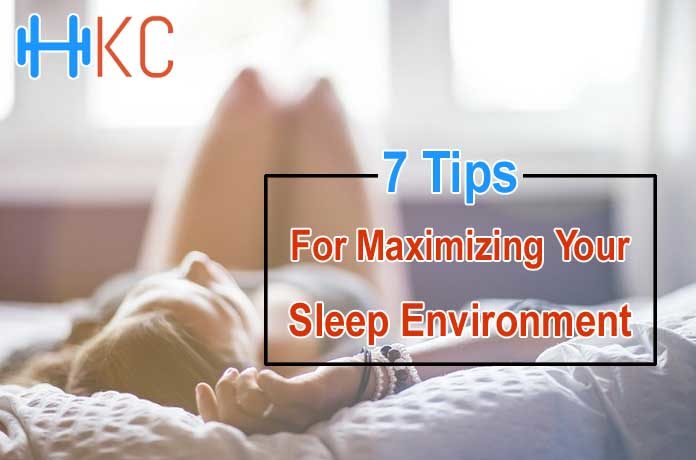7 Tips for Maximizing Your Sleep Environment
Difficulties in falling and staying sleep have become quite common. This can be caused by a number of factors including, stress, discomfort, a medical condition, anxiety, jet lag, and so on. People are becoming more and more aware of the importance of having quality sleep. They are making sleep a priority and understanding why a following a consistent bedtime routine, eating healthy, relaxing, and exercising regularly can be beneficial. On top of that, your sleep environment matters a lot. Seeing that sleep is a sensory experience, an ideal sleep environment will have to pay attention to all five senses: touch, taste, sight, smell, and sound. Having said that, here’s how you can optimize your sleep environment:
Declutter
Instead of inducing sleep, many people’s bedrooms actually distract them from a good night’s sleep. Your bedroom isn’t an office, a gym, and a playroom all in one. Begin associating it with sleep and intimacy only. When you use your bedroom for other activities, your brain begins to associate it with those activities. For instance, if it acts as your office, you correlate it with busy work and in turn, it makes your mind busy and even anxious about work. Take time to pick up dirty clothes, put away the clean piles of laundry, keep the bedroom squeaky clean, and get rid of anything that might be a potential distraction. If you want to go extreme, all that should be left in your bedroom is a bed, a simple nightstand, and blackout blinds.
Ditch All Electronics
Your bedroom should be a calm and relaxed space with no technological toys, including phones, game console, TV, computer, laptop, tablet, or e-reader. While there’s nothing wrong with putting your electronics in the bedroom, the best way to avoid using them before bed is keeping them away from the bedroom altogether. These devices emit blue light, which tricks the body into wakefulness. Exposure to light during the night slows down the production of melatonin (a sleep-inducing hormone), making it more difficult to fall asleep. Electronic devices also engage the brain and cause it to be more active. For instance, watching TV before bed can keep you awake longer as you get sucked into your favorite shows. In addition, buzzes, beeps, and standby lights from these electronics can be distracting.
Keep Your Room Dark & Cool
Our body clocks react to external stimuli to shift body processes from time to time. The signal for sleep is the level of brightness in your surroundings. Artificial light mimics natural light, and we’ve already discussed how exposure to light during the night can make it harder for you to fall asleep. The brain automatically goes into sleep mode when the environment is dark. Therefore, turn off all lights, get blackout blinds or heavy curtains, and consider getting a sleep mask to block out all lights possible. You should also strive to keep the room as cool as possible to allow your body to cool down in readiness for several hours of inactiveness. The recommended bedroom temperature is between 60 and 70 degrees Fahrenheit, but you can also experiment to find out which bedroom temperatures make you most comfortable.
Make Your Bed Comfortable
The bed is the centerpiece of any bedroom and the key to a good night’s sleep. Are you waking up feeling tired, stiff, or numb in your current sleeping environment? Well, it’s probably time to replace your mattress, bed, and beddings. Buy a bed that provides enough support for your weight and build. When it comes to size, the general rule of thumb is to find the largest bed that can fit into the space available. The larger the bed, the more room you, and anyone else sharing it, have to move without disturbing each other’s sleep. You also need a good mattress, which we’ll discuss below, and comfortable beddings. Consider finding exquisitely soft, hypoallergenic, and breathable pillows, bed sheets, blankets/duvets, and other beddings, for a comfortable night of sleep. The upfront costs of these pieces can seem scary but given how long they can last, it’s a sound investment.
Assess Your Mattress
Comfort is pretty important when you want to get a restful night, and your mattress has everything to do with that. Mattresses are generally designed to last 7-10 years, but if yours has lumps, rips, sags, or holes, consider replacing it. From memory foam to gel, latex, innerspring, hybrid, and even air mattresses, you are spoilt for choice when it comes to mattresses available for sale. Then you have to think about firmness, size, pillow tops, support features, cost, and so on. Choose a mattress depending on your personal preference, sleeping style (one that will keep your spine properly aligned), and body weight. With so much to consider, buying the right mattress can seem overwhelming. In simpler terms, the best mattress for you is one that allows you to sleep peacefully and wake up without any pains or aches. Make sure you try out the mattress before buying it.
Sounds Are Important
Another common cause of sleep deprivation is noise. Whether it’s from the bedroom itself, down the hall, or outside, it can hinder you from falling and staying asleep. If you need silence, consider using earplugs, turn off all digital devices, close your windows and doors, and if possible, soundproof your bedroom. Note that, it’s not the noise itself that disrupts your sleep, but rather the inconsistency of sound. Plus, some people need some level of sound to sleep. In that case, invest in a white noise machine. These sound machines produce soothing background sounds that block out unwanted noise and lull you to sleep. If you need softer sound to sleep, consider buying a small fan. A fan creates continuous background noise, which produces enough white noise that soothes you the entire night.
Pay Attention to Scent
Introducing the right scents in your bedroom can enhance a sleep-friendly environment. Studies have shown that scents of certain essential oils can promote sleep, which is where aromatherapy comes in. These scents are known to decrease blood pressure and heart rate, as well as help you lose your senses to help you sleep faster. Some of the essential oils to consider include lavender, vanilla, marjoram, chamomile, ylang-ylang, geranium, and bergamot. Add a few drops of your ideal essential oil in a diffuser with a bit of water. Turn it on by your bedside and you’ll be in dreamland in no time. Aromatherapy comes in several other forms, including massage oils, pillow and linen sprays, bath oils, and sachets. For a more natural scent, consider introducing fresh air into the bedroom. The simplest way to do so is to open the windows daily; alternatively, you can invest in an air purifier to clear out air pollutants and odors.















